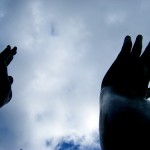Every Jew a mystic
 Judaism regards Rosh HaShanah and Yom Kippur as occasions when holiness and communion come together and form the keynote of the experience – in four senses: communion with God, with fellow man, with Judaism and with oneself.
Judaism regards Rosh HaShanah and Yom Kippur as occasions when holiness and communion come together and form the keynote of the experience – in four senses: communion with God, with fellow man, with Judaism and with oneself.
The poems and prayers of these days illustrate Evelyn Underhill’s definition of mysticism as the act of establishing man’s conscious awareness of the presence of the Divine.
It is of course possible to sense that presence wherever one is, in a forest, by a river, both in solitude and in company. King Solomon says in Mishlei, “In all your ways, recognise Him”.
The sense of holiness in company is the best argument for High Holyday synagogue services.
They make us part of a community in two ways noted by Jonathan Sacks – a kahal, a group of human beings who have congregated together; an edah, a coherent community who share the yearning for truth and inspiration.
Even a rebel like Korach could sense that “all the people are holy, and God is in their midst”.
Following the familiar Jewish rituals and well-loved words and melodies enables one to commune with Judaism.
Max Kadushin calls this normal mysticism, discerning God in every hallowed act. Every mitzvah, every b’rachah, is a mystical moment.
Each of us communes with him- or herself too on the High Holydays.
The paradox of being Jewish calls for drawing close to other people – and at times, drawing apart.
There are moments to close oneself off from the synagogue, the service, the prayers, the community and even from God, and to turn inward and ask, “Who am I? Where am I in life? Am I the best possible Me?”
In Eretz Yisra’el in the 16th century, the groups of mystics – centred upon Safed – communed with the Mishnah. It spoke to them and with them, and they responded.
On Rosh HaShanah and Yom Kippur our privilege is to be modern mystics, and to commune with holiness on four planes. We don’t use the technical term Holy Communion – but in a sense that’s what it is.



